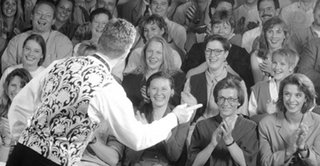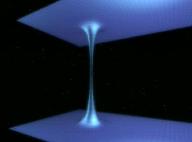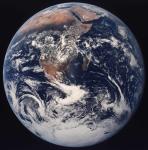 Many of us were given the grim impression that everything had been figured out, even if the answers were incredibly boring.
Many of us were given the grim impression that everything had been figured out, even if the answers were incredibly boring. This has taken a heavy spiritual toll. Many people, myself included, have drooped under the burden of living in a world where everything seems to be known, where all mysteries have been answered. The basis of spiritual belief is wonder. How can we live in a world without it?
Yet something remarkable is happening in laboratories around the world. Wonder is making a comeback. The evolving world of quantum physics is making us question the very nature of reality, the universe and ourselves.
Quantum physics is the study of the very small and the very fast. When we look at things on that scale the world is a very different place than the one familiar to us.
Try to imagine that tiny particles of matter don’t actually exist in any one place - that they instead exist only in an ethereal cloud of “probabilities”- a kind of quantum limbo.
While these probabilities give a good idea of where to look for a given speck of matter, these tiny bits of the universe don’t snap into existence until we look at them.
It gets weirder.
Particles can become “entangled”– even if they are on opposite sides of the universe. If you change one by observing it, the other instantaneously changes to have the exactly same properties – ignoring the speed of light.
All this was too much even for Einstein – a man who believed “imagination is more important than knowledge”. He called such entanglements “spooky” and spent much of his latter life trying in vain to disprove quantum theory. Yet it is now described as “the most precisely tested and most successful theory in the history of science”. And the more we look, the weirder it gets.
A recent poll showed most physicists believe many parallel universes exist, that they are superimposed on each other and interact in some way.
Or how about “wormholes”? These are imagined cosmic shortcuts through space and time, or perhaps between different universes.
 Again they are widely considered possible, if not likely, by mainstream scientists.
Again they are widely considered possible, if not likely, by mainstream scientists. While Quantum theory does a superb job of predicting what will happen at a very small scale, the why’s and how’s of this weird world remain completely unknown.
It seems that science is not just exploring the outer limits of human knowledge, but human imagination as well. " As the famous physicist Neils Bohr said, “Anyone who is not shocked by the quantum theory has not understood it."
So what does this have to do with spirituality? Many people are drawing spiritual inspiration from the possibilities posed by quantum physics. For instance, the film “What the Bleep Do We Know” made a big splash – grossing over $12 million.
The film makes the case that because quantum physics indicates an infinite number of possible realities exist, and we need only choose a positive one rather than be pulled along by a destructive one.
I don’t think anyone would dispute the power of positive thought. The world is certainly a very different place depending on your attitude. But what does that have to do with quantum physics? And what does quantum physics have to do with our day-to-day lives?
Not much, according to Dr. David Albert, a professor of physics and philosophy at Columbia University in New York. Dr. Albert appeared both the original “What the Bleep” film and the recently released director’s cut.
According to Albert, the film is “swarming with scientific inaccuracies, and its overall thesis is in my opinion wildly and irresponsibly wrong.” Not a great review, especially from one of the featured scientists in film. He also maintains that most scientists would find the conclusions of the film “preposterous”.
While Albert specializes in philosophical problems of quantum mechanics, he remains very skeptical of any leap from quantum physics to New Age spirituality. He feels that main flaw with the film and many New Age beliefs is that they do not “resist the temptation to see us in the see ourselves in the centre of everything”, something he equates it to the struggle between Galileo and the Vatican.
Albert feels the only truly respectful way to regard the universe is to exercise detachment - to see it for what it is, rather than part of our pre-existing beliefs. “There is immense wonder there, but you are not going to see it if you insist on being vague and hand wavy and touchy feely about it.”
We should remember however that science can be very stiff at dealing with issues that it doesn’t yet understand. For instance, most physicists subscribe to the “shut up and calculate” school of thought, which maintains that trying to interpret the weirdness of quantum physics is not just pointless, it should be avoided.
To get another perspective, I contacted Dr. Edgar Mitchell, an Apollo 14 astronaut and the 6th person to walk on the moon. He is also the founder of the Institute of Noetic Sciences in California, which seeks to understand the nature of consciousness through science. Many of the experts featured in “What the Bleep” are associated with the institute.
Like many people who traveled in space, Mitchell had a powerful epiphany looking down on our beautiful planet from the vantage of 300,000 km – what he calls the “ultimate mountain-top experience”.

“When I got back this experience was so powerful I couldn’t ignore it. So I established the institute to do research into the area of consciousness, which had been a no-no subject in science up until that time. It is an effort to bring science and spirituality into a common understanding.”
He is currently focusing on what he calls the quantum hologram – a kind of experiential hard drive in the sky he believes allows people to access the experiences of other conscious beings. He believes that what we experience as consciousness is an artifact of the complexity of our brains and quantum physics. According to Mitchell our understanding of the universe has a long way to go. “We are only really scratching the surface, we are just barely out of the trees for heavens sake.”
Is he correct? One thing is certain, no physicist would claim that we really yet understand what is going on. My reluctant skepticism will not allow me to embrace many of his beliefs, such as energy healing at a distance. The $200 entrance fee for these workshops sets off some obvious alarm bells. Yet I find myself questioning many of my own beliefs and what we experience as reality.
I have no doubt that many of the people reading this will be lucky enough to be around when some truly astounding truths about our universe are revealed. It seems that science is returning the scene of the crime and restoring some of the wonder of the world that was so coldly demystified.
As one who has drooped in the absence of wonder, I am comforted to learn how little we understand about the universe, even if those mysteries seem to have little to do with us. At least not yet.
Mitchell Anderson is a freelance writer who lives in Vancouver. This piece was published in Shared Vision in April 2005.